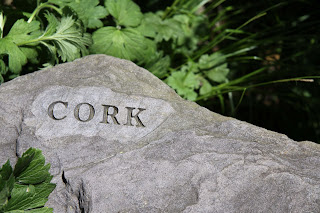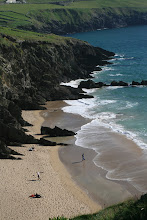While the Greeks protest harsh economic austerity measures in Athens, the good Irish people are dealing with their own hard times with “Fiver Friday” on July 1.
RTE presenter Joe Duffy suggested that regular punters go out and spend an extra fiver locally on Friday to stimulate the economy. Retailers and service people responded with special offers – a meal, a car wash, a wedding photo, concert tickets, etc. – for a fiver. The offers have flooded the radio station’s phone lines. Two hundred businesses in Mullingar alone are participating.
Fires are burning and tear gas is filling Athens streets. One man explained, “We have the sun, the tourists, some vegetables and olive oil,” and no other industry. There is no way Greece will be able to pay the mammoth debt it has taken on. The cuts to pensions and social services are desperate measures for desperate times.
The threat of the same thing happening in Ireland has been put off only because the Irish people go willingly along with the budget cuts – they complain and call into the talk shows, but very few would come out on the streets like the Greeks.
Hope that Fiver Friday adds a few bob to the pockets of many Irish shopkeepers who are trying to provide for their families in difficult times.
Wednesday, June 29, 2011
Friday, June 10, 2011
May a Courageous Irish Man R.I.P.
Sad news this morning hearing on RTE of the death of Brian Lenihan, former Irish Minister of Finance, who died of cancer today at age 52.
Lenihan learned that he had pancreatic cancer in December 2009, in the midst of the worst economic crisis ever faced by Ireland and perhaps the western economies since the Great Depression. He continued on with both his brief and chemotherapy until his Fianna Fail party was unseated by Fine Gael in February 2011.
He took on the post of Finance Minister in May 2008, shortly before the housing and banking crisis. Under Lenihan the Irish State guaranteed all the Irish banks in September 2008.Who would have been prepared to handle the banking crisis which was itself a worldwide cancer? It was up to Lenihan to put together the massive cuts of the December 7, 2010, brutal budget.
Listening to RTE, the tributes all deem Lenihan to have been a “decent man” of great personal courage and humor who was dedicated to the work he had been given.
This comes in contrast to some politicians in Ireland, the U.S., Italy, etc., who have no personal dignity whatsoever and find themselves embarrassed and on front pages.
Maybe courage and honor and grace are old-fashioned attributes. But when a man or woman lives with courage or honor, people do take notice and mourn the passing of someone good.
Lenihan learned that he had pancreatic cancer in December 2009, in the midst of the worst economic crisis ever faced by Ireland and perhaps the western economies since the Great Depression. He continued on with both his brief and chemotherapy until his Fianna Fail party was unseated by Fine Gael in February 2011.
He took on the post of Finance Minister in May 2008, shortly before the housing and banking crisis. Under Lenihan the Irish State guaranteed all the Irish banks in September 2008.Who would have been prepared to handle the banking crisis which was itself a worldwide cancer? It was up to Lenihan to put together the massive cuts of the December 7, 2010, brutal budget.
Listening to RTE, the tributes all deem Lenihan to have been a “decent man” of great personal courage and humor who was dedicated to the work he had been given.
This comes in contrast to some politicians in Ireland, the U.S., Italy, etc., who have no personal dignity whatsoever and find themselves embarrassed and on front pages.
Maybe courage and honor and grace are old-fashioned attributes. But when a man or woman lives with courage or honor, people do take notice and mourn the passing of someone good.
Friday, June 3, 2011
Visit the Irish Hunger Memorial in NYC

 For years, I knew there was an Irish Hunger Memorial set in Lower Manhattan, but hadn't made the journey to see it until yesterday.
For years, I knew there was an Irish Hunger Memorial set in Lower Manhattan, but hadn't made the journey to see it until yesterday.I found a small corner of Ireland in Battery Park City at Vesey Street and North End Avenue. Here artist Brian Tolle created on a half acre a living reminder of the Irish Famine of 1845-52, "An Gorta Mor," an event which brought many, including my own great-grandmother, from Ireland to the U.S.
At the heart of the monument is a derelict Famine-era fieldstone cottage, which was brought from County Mayo and reconstructed on the site. A winding path circles small fields dotted with native Irish plants including bearberry, blackthorn, burnet rose, foxglove, gorse and heather. The yellow flag irises were just a few days past blooming.
Set along the pathways are 32 large stones, each one etched with name of one of the Irish counties. You can easily find Cork, Kerry, Tyrone, Monaghan and Armagh. Other names hide under grass or at the sides of stones.
The entire memorial is supported by a limestone plinth and overlooks a small fountain pond and the boat traffic on the Hudson River.
Quotations from Irish texts and authors encircle the outside wall of the base of the memorial. More text on the Famine times lines the walls of the passageway entrance to the memorial. Listen carefully to hear the audio presentation about world hunger during the short walk.
There was no signage on the nearby streets directing to the memorial, but the site should call to the naturally curious. The gorse was not in bloom yet, so I will have to go back to see the profusion of yellow that promises.
Subscribe to:
Comments (Atom)
